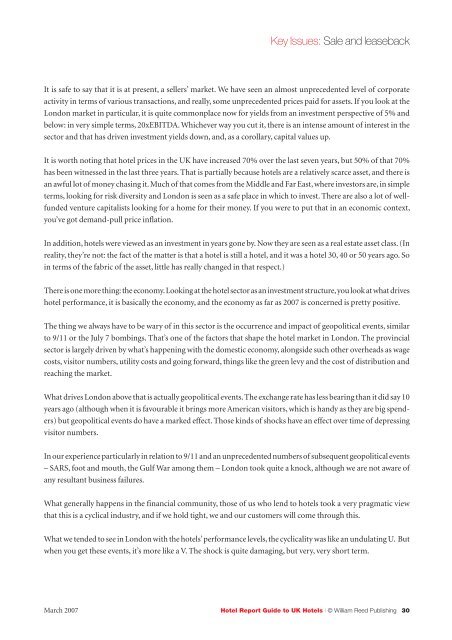1 Hotel cover.indd - Nicola Cottam
1 Hotel cover.indd - Nicola Cottam
1 Hotel cover.indd - Nicola Cottam
You also want an ePaper? Increase the reach of your titles
YUMPU automatically turns print PDFs into web optimized ePapers that Google loves.
Key Issues: Sale and leaseback<br />
It is safe to say that it is at present, a sellers’ market. We have seen an almost unprecedented level of corporate<br />
activity in terms of various transactions, and really, some unprecedented prices paid for assets. If you look at the<br />
London market in particular, it is quite commonplace now for yields from an investment perspective of 5% and<br />
below: in very simple terms, 20xEBITDA. Whichever way you cut it, there is an intense amount of interest in the<br />
sector and that has driven investment yields down, and, as a corollary, capital values up.<br />
It is worth noting that hotel prices in the UK have increased 70% over the last seven years, but 50% of that 70%<br />
has been witnessed in the last three years. That is partially because hotels are a relatively scarce asset, and there is<br />
an awful lot of money chasing it. Much of that comes from the Middle and Far East, where investors are, in simple<br />
terms, looking for risk diversity and London is seen as a safe place in which to invest. There are also a lot of wellfunded<br />
venture capitalists looking for a home for their money. If you were to put that in an economic context,<br />
you’ve got demand-pull price inflation.<br />
In addition, hotels were viewed as an investment in years gone by. Now they are seen as a real estate asset class. (In<br />
reality, they’re not: the fact of the matter is that a hotel is still a hotel, and it was a hotel 30, 40 or 50 years ago. So<br />
in terms of the fabric of the asset, little has really changed in that respect.)<br />
There is one more thing: the economy. Looking at the hotel sector as an investment structure, you look at what drives<br />
hotel performance, it is basically the economy, and the economy as far as 2007 is concerned is pretty positive.<br />
The thing we always have to be wary of in this sector is the occurrence and impact of geopolitical events, similar<br />
to 9/11 or the July 7 bombings. That’s one of the factors that shape the hotel market in London. The provincial<br />
sector is largely driven by what’s happening with the domestic economy, alongside such other overheads as wage<br />
costs, visitor numbers, utility costs and going forward, things like the green levy and the cost of distribution and<br />
reaching the market.<br />
What drives London above that is actually geopolitical events. The exchange rate has less bearing than it did say 10<br />
years ago (although when it is favourable it brings more American visitors, which is handy as they are big spenders)<br />
but geopolitical events do have a marked effect. Those kinds of shocks have an effect over time of depressing<br />
visitor numbers.<br />
In our experience particularly in relation to 9/11 and an unprecedented numbers of subsequent geopolitical events<br />
– SARS, foot and mouth, the Gulf War among them – London took quite a knock, although we are not aware of<br />
any resultant business failures.<br />
What generally happens in the financial community, those of us who lend to hotels took a very pragmatic view<br />
that this is a cyclical industry, and if we hold tight, we and our customers will come through this.<br />
What we tended to see in London with the hotels’ performance levels, the cyclicality was like an undulating U. But<br />
when you get these events, it’s more like a V. The shock is quite damaging, but very, very short term.<br />
March 2007 <strong>Hotel</strong> Report Guide to UK <strong>Hotel</strong>s l © William Reed Publishing 30


